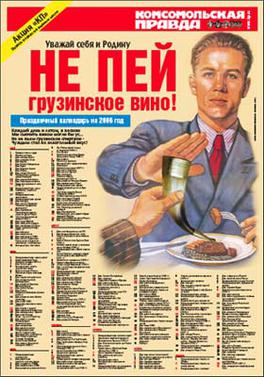2006 Russian ban of Moldovan and Georgian wines
2006 Russian ban of Moldovan and Georgian wines
The 2006 Russian ban of Moldovan and Georgian wines was a significant trade embargo imposed by the Russian Federation on Moldova and Georgia. The ban was officially enacted in March 2006 and had substantial economic and political ramifications for both countries.
Background[edit | edit source]
The Russian Federation has historically been a major market for Moldovan and Georgian wines. Both countries have long-standing traditions of viticulture and wine production, with their wines being highly regarded in the CIS region. The ban was ostensibly imposed due to concerns over the quality and safety of the wines, with Russian authorities citing contamination and falsification issues.
Economic Impact[edit | edit source]
The ban had a severe impact on the economies of both Moldova and Georgia. Wine exports constituted a significant portion of their GDP, and the sudden loss of the Russian market led to substantial financial losses. In response, both countries sought to diversify their export markets and improve the quality of their wine production to meet international standards.
Moldova[edit | edit source]
In Moldova, the wine industry is a crucial sector, employing a large portion of the population. The ban led to a sharp decline in wine exports, forcing producers to seek new markets in the European Union, United States, and Asia. The Moldovan government also implemented reforms to enhance the quality and competitiveness of its wine industry.
Georgia[edit | edit source]
Similarly, the ban had a profound effect on Georgia, where wine is not only an economic asset but also a cultural symbol. Georgian wine producers intensified their efforts to penetrate new markets, particularly in the European Union, China, and the United States. The Georgian government also took steps to improve wine quality and branding to appeal to international consumers.
Political Implications[edit | edit source]
The ban was widely perceived as a political move by the Russian Federation to exert pressure on Moldova and Georgia, both of which were pursuing closer ties with the European Union and NATO. The embargo strained diplomatic relations and was seen as part of a broader strategy of economic coercion.
Lifting of the Ban[edit | edit source]
The ban on Moldovan wines was partially lifted in 2007, and by 2013, most restrictions had been removed. For Georgian wines, the ban was lifted in 2013 following negotiations and improvements in wine quality standards. The lifting of the ban allowed both countries to regain access to the Russian market, although they continued to focus on diversifying their export destinations.
See Also[edit | edit source]
- Moldovan wine
- Georgian wine
- Russia–Georgia relations
- Russia–Moldova relations
- 2006 Russian ban of Polish meat
References[edit | edit source]
External Links[edit | edit source]
Search WikiMD
Ad.Tired of being Overweight? Try W8MD's physician weight loss program.
Semaglutide (Ozempic / Wegovy and Tirzepatide (Mounjaro / Zepbound) available.
Advertise on WikiMD
|
WikiMD's Wellness Encyclopedia |
| Let Food Be Thy Medicine Medicine Thy Food - Hippocrates |
Translate this page: - East Asian
中文,
日本,
한국어,
South Asian
हिन्दी,
தமிழ்,
తెలుగు,
Urdu,
ಕನ್ನಡ,
Southeast Asian
Indonesian,
Vietnamese,
Thai,
မြန်မာဘာသာ,
বাংলা
European
español,
Deutsch,
français,
Greek,
português do Brasil,
polski,
română,
русский,
Nederlands,
norsk,
svenska,
suomi,
Italian
Middle Eastern & African
عربى,
Turkish,
Persian,
Hebrew,
Afrikaans,
isiZulu,
Kiswahili,
Other
Bulgarian,
Hungarian,
Czech,
Swedish,
മലയാളം,
मराठी,
ਪੰਜਾਬੀ,
ગુજરાતી,
Portuguese,
Ukrainian
Medical Disclaimer: WikiMD is not a substitute for professional medical advice. The information on WikiMD is provided as an information resource only, may be incorrect, outdated or misleading, and is not to be used or relied on for any diagnostic or treatment purposes. Please consult your health care provider before making any healthcare decisions or for guidance about a specific medical condition. WikiMD expressly disclaims responsibility, and shall have no liability, for any damages, loss, injury, or liability whatsoever suffered as a result of your reliance on the information contained in this site. By visiting this site you agree to the foregoing terms and conditions, which may from time to time be changed or supplemented by WikiMD. If you do not agree to the foregoing terms and conditions, you should not enter or use this site. See full disclaimer.
Credits:Most images are courtesy of Wikimedia commons, and templates Wikipedia, licensed under CC BY SA or similar.
Contributors: Prab R. Tumpati, MD

